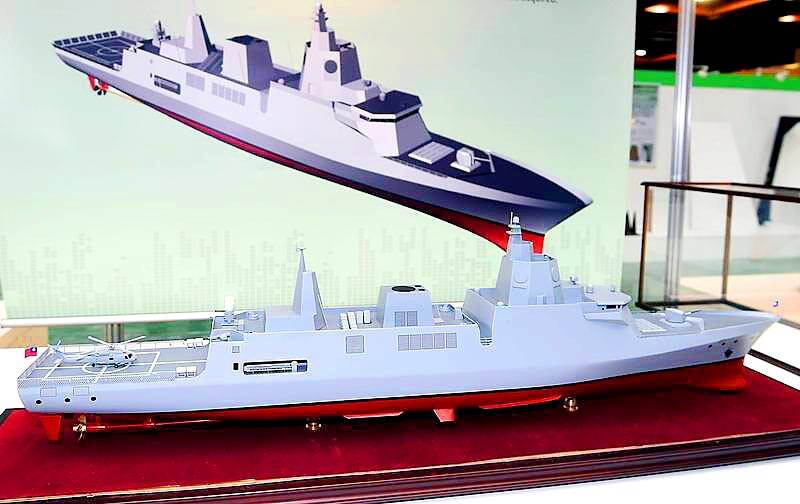Mishandling of a guided missile frigate program has set Taiwan two decades behind its peers, the Control Yuan said yesterday as it handed down a corrective measure against the Navy Command and the Ministry of National Defense over the issue.
Failure to build new frigates on time and in sufficient quantity has robbed the navy of initiative amid the “gray zone” tactics of China, Control Yuan members Lai Ting-ming (賴鼎銘), Lin Wen-cheng (林文程) and Hsiao Tzu-yu (蕭自佑) wrote in a news release.
In 2008, the ministry and top navy brass began plans to obtain a flotilla of next-generation frigates with an emphasis on modern battle management capabilities equivalent to the Aegis combat system, the members said.

Photo: Taipei Times
Defense officials and navy commanders launched two programs to develop the indigenous frigates — the 2012 Xunlian Project for the Aegis-like combat system and other equipment for the ships, and the 2014 Zhenhai Project for the frigates themselves, the members said.
The projects ran into a multitude of setbacks, most of which stemmed from indecision, as the groups involved were unable to agree on a common set of requirements and constantly backpedaled on decisions, they said.
Disagreements erupted a month after the ministry submitted a plan for the projects and the navy demurred from signing a contract for the Zhenhai Project with the Chungshan Institute of Science and Technology, citing the program’s “immaturity,” the members said.
In April 2020, the navy declared that the acquisition of shipborne active electronically scanned array radars (AESA) to replace passive arrays was a high priority and linked the AESA to the Zhenhai Project without changing the project’s timetable, they said.
That meant the navy had reversed its decision to use the Chungshan Institute to build the ships, they said.
Six months later, navy brass moved to terminate the Xunlian Project, citing a failure to meet capability requirements despite its certification to the contrary, they said.
In 2021, the navy scrapped the original concept for frigates with Aegis-equivalent systems altogether, instead proposing to build just two light frigates to counter incursions by the Chinese People’s Liberation Army Navy, they said.
The service had seriously erred in its indecisiveness over the frigate program’s requirements and acting in contradiction to the requirements set by the Zhenhai Project, which accepted the utilization of passive electronically scanned arrays (PESA), they said.
Although Taiwan’s navy in 2017 submitted an AESA solicitation to the Chungshan Institute, the documentation showed that the capability requirements it described were virtually identical to the PESA system proposed in the Zhenhai Project, the members said.
There was no ground for the navy to claim that the institute failed to deliver a system with the required specifications because of the potentially misleading solicitation, they said.
As the party responsible for establishing the performance metrics of the combat system, the navy committed obvious errors in not providing consistent specifications for the capabilities it wanted, they said.
The ramifications of the mistakes include the navy’s loss of initiative in waters around Taiwan, a 20-year technology lag by the standards of regional naval forces and a continued reliance on Chi Yang-class frigates, which have been in service for more than 50 years, they added.
Additional reporting by CNA

Alain Robert, known as the "French Spider-Man," praised Alex Honnold as exceptionally well-prepared after the US climber completed a free solo ascent of Taipei 101 yesterday. Robert said Honnold's ascent of the 508m-tall skyscraper in just more than one-and-a-half hours without using safety ropes or equipment was a remarkable achievement. "This is my life," he said in an interview conducted in French, adding that he liked the feeling of being "on the edge of danger." The 63-year-old Frenchman climbed Taipei 101 using ropes in December 2004, taking about four hours to reach the top. On a one-to-10 scale of difficulty, Robert said Taipei 101

Nipah virus infection is to be officially listed as a category 5 notifiable infectious disease in Taiwan in March, while clinical treatment guidelines are being formulated, the Centers for Disease Control (CDC) said yesterday. With Nipah infections being reported in other countries and considering its relatively high fatality rate, the centers on Jan. 16 announced that it would be listed as a notifiable infectious disease to bolster the nation’s systematic early warning system and increase public awareness, the CDC said. Bangladesh reported four fatal cases last year in separate districts, with three linked to raw date palm sap consumption, CDC Epidemic Intelligence

Taiwanese and US defense groups are collaborating to introduce deployable, semi-autonomous manufacturing systems for drones and components in a boost to the nation’s supply chain resilience. Taiwan’s G-Tech Optroelectronics Corp subsidiary GTOC and the US’ Aerkomm Inc on Friday announced an agreement with fellow US-based Firestorm Lab to adopt the latter’s xCell, a technology featuring 3D printers fitted in 6.1m container units. The systems enable aerial platforms and parts to be produced in high volumes from dispersed nodes capable of rapid redeployment, to minimize the risk of enemy strikes and to meet field requirements, they said. Firestorm chief technology officer Ian Muceus said

MORE FALL: An investigation into one of Xi’s key cronies, part of a broader ‘anti-corruption’ drive, indicates that he might have a deep distrust in the military, an expert said China’s latest military purge underscores systemic risks in its shift from collective leadership to sole rule under Chinese President Xi Jinping (習近平), and could disrupt its chain of command and military capabilities, a national security official said yesterday. If decisionmaking within the Chinese Communist Party has become “irrational” under one-man rule, the Taiwan Strait and the regional situation must be approached with extreme caution, given unforeseen risks, they added. The anonymous official made the remarks as China’s Central Military Commission Vice Chairman Zhang Youxia (張又俠) and Joint Staff Department Chief of Staff Liu Zhenli (劉振立) were reportedly being investigated for suspected “serious